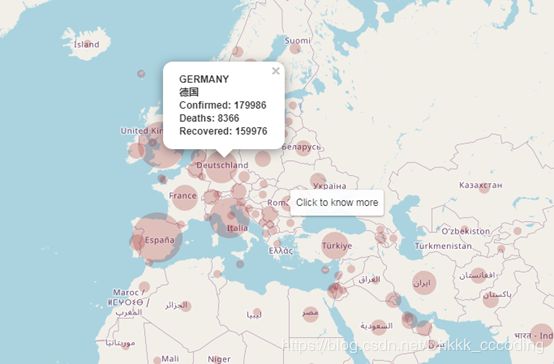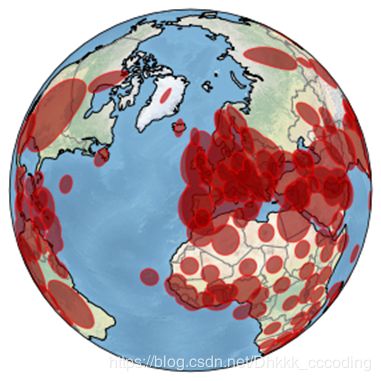新冠肺炎疫情数据爬取以及几种简单的地图可视化方法
众所周知,新冠肺炎疫情是一次很流行的全球性公共卫生事件。如今我国疫情已经好了许多,但世界各国的疫情依然严峻。特殊时期,正好尝试一下疫情网络数据的抓取,并用几种python库对数据进行简单的地图可视化(folium,geopandas,cartopy)。
1. 爬取疫情数据
许多网站都记录了实时的疫情数据,但不是所有的数据都可爬。这里用的是必应的新冠肺炎追踪(https://www.bing.com/covid),理由是(1)它的源代码里有所有详细的数据;(2)从全球到国家到地方都有数据,结构是嵌套的,详细全面可爬;(3)重点,数据居然带经纬度信息!这对地理制图就很友好了。
import urllib.request as req
import bs4
import json
# read source code and scrape data
url = 'https://www.bing.com/covid'
response = req.urlopen(url)
data = response.read().decode('utf-8')
root = bs4.BeautifulSoup(data, "html.parser")
text = root.find(id="main").get_text()
maintext = text[9:-1]
textlist = json.loads(maintext) # str to list
del url, response, data
# country data
countryData = textlist["areas"]
for country in countryData:
templist = []
templist.append(country["id"])
templist.append(country["displayName"])
templist.append(country["totalConfirmed"])
templist.append(country["totalDeaths"])
templist.append(country["totalRecovered"])
try: # some coordinate data is missed
templist.append(country["long"])
templist.append(country["lat"])
except:
pass
datalist.append(templist)
del templist根据网页源代码,每个地区的数据都存在一个字典里面,字典字段包含id,displayName,areas,totalConfirmed,totalDeaths,totalRecovered,lat,long等等,其中areas里面是该地区内的子区域数据,例如美国加州的数据就在美国字典里的areas里面,所以各级的数据都可以找到。这里就简单爬个全球各国家、地区的确诊,死亡,治愈人数。爬下来之后写进excel,一共有两百多个国家或地区,长这样:
2 可视化
有了这些数据之后开始制图,这里尝试了三种python库:(1)folium;(2)geopandas;(3)cartopy。
(1)folium
folium能简单地创建一个交互式地图。支持OSM,Mapbox,高德百度等底图,所以各种API也可以放里面使用。因为是交互式的,且地图是显示在网页,所以在jupyter notebook使用比较友好。这里模仿Bing疫情追踪的网站,用圆圈大小代表全球各地的确诊人数,然后点击圆圈能显示人数的详细信息。
# --------------------------------------------------------------------
# Visualization1: folium
# --------------------------------------------------------------------
# init map
map1 = folium.Map(
location = [43.52902984,12.16218376],
zoom_start = 2,
min_zoom = 2,
max_zoom = 10,
#tiles = 'Stamen Toner'
tiles = 'OpenStreetMap'
)
data = xlrd.open_workbook('C:/Users/user/Desktop/COVID-19-Data.xls')
table = data.sheets()[0]
for i in range(table.nrows-2) :
templist = table.row_values(i+2)
# information in popup
popup = '' + templist[0].upper() + '' + templist[1] + ''
popup += 'Confirmed: ' + str(int(templist[2]))
try: popup += 'Deaths: ' + str(int(templist[3])) # some are none, cant be int()
except: popup += 'Deaths: ' + str(templist[3])
try: popup += 'Recovered: ' + str(int(templist[4]))
except: popup += 'Recovered: ' + str(templist[4])
# easy function to classify the radius of circle
radius = classifyRadius(templist[2])
# add marker
folium.CircleMarker(
location = [templist[6], templist[5]],
popup=folium.Popup(popup, max_width=200),
radius = radius,
tooltip='Click to know more',
color = 'transparent',
fill = True,
fill_color='#8B0000'
).add_to(map1)
del templist, popup, radius
map1.save('C:/Users/user/Desktop/map1.html')
del data, table
print ("finished map1 by folium")效果如下。特点是很简单的交互式地图,用自带的底图就不用申请什么key,需要多样的内容也可以用其他来源的地图,极其自由多样。marker有很多种类型可以选择,主要在marker的内容里面做文章。
(2)geopandas
geopandas是pandas库的扩展模块,包含两种数据结构,其中GeoSeries相当于地理信息,GeoDataFrame相当于地理信息+属性信息,所以每个GeoDataFrame都包含一个GeoSeries。空间分析功能比较全面,但比较麻烦的是这个库还需要很多其他库的支持:shapely用于地理处理,fiona用于访问文件,dechartes和matplotlib用于制图,为了更丰富的分级显示方法则还需要mapclassify。安装都花了一些时间,具体可参考https://www.hatarilabs.com/ih-en/how-to-install-python-geopandas-on-anaconda-in-windows-tutorial
这里面有自带的世界地图各国的地理数据,刚好可以和爬取的疫情数据相结合。通过疫情数据的地理坐标进行spatial join,就可以把两个数据结合起来,进行可视化。
# --------------------------------------------------------------------
# Visualization2: geopandas
# --------------------------------------------------------------------
# read data and change to geopandas format
data = xlrd.open_workbook('C:/Users/user/Desktop/COVID-19-Data.xls')
table = data.sheets()[0]
datadict = {'country':table.col_values(0)[2:],
'confirmed':table.col_values(2)[2:],
'deaths':table.col_values(3)[2:],
'recovered':table.col_values(4)[2:],
'longtitude':table.col_values(5)[2:],
'latitude':table.col_values(6)[2:]}
df = pandas.DataFrame(datadict)
cov19data = geopandas.GeoDataFrame(df, geometry=geopandas.points_from_xy(df.longtitude, df.latitude))
# world data with all country polygon in geopandas-built-in data
world = geopandas.read_file(geopandas.datasets.get_path('naturalearth_lowres'))
# spatial join
world_cov19 = geopandas.sjoin(world, cov19data, how="inner", op='intersects')
fig, ax = plt.subplots(1, 1, figsize=(15,10))
world_cov19.plot(column='confirmed',
ax=ax,
cmap='Reds', # color type
scheme='NaturalBreaks', # classify scheme
k=12, # number of classify
legend=True,
legend_kwds={'loc':'lower left','title':'COV-19 Confirmed Cases'})
plt.show()
print ("finished map2 by geopandas")效果如下。
(3)cartopy
cartopy也是一个能用于空间分析的库,特点是提供了很多种投影定义,可以从不同视角制图,个人认为图的颜值也比较高。值得一提的是,这个库不能像folium一样创建circleMarker,想用圆圈大小表示疫情,只能创建点-创建点的缓冲区。
# --------------------------------------------------------------------
# Visualization3: cartopy
# --------------------------------------------------------------------
def COV19_cartopy():
# read data and classify
data = xlrd.open_workbook('C:/Users/user/Desktop/COVID-19-Data.xls')
table = data.sheets()[0]
pointList, radiusList = classifyRadius(templist[2], table)
# create buffer to draw a circle
def addBuffer2ax(ax, pointList, radiusList):
for i in range(len(pointList)):
circles = geometry.MultiPoint(pointList[i]).buffer(radiusList[i])
cov19data = cfeature.ShapelyFeature([circles], ccrs.PlateCarree())
ax.add_feature(cov19data, edgecolor='red', facecolor='#8B0000',alpha=0.6)
del circles, cov19data
# define layer in cartopy
fig = plt.figure(figsize=(10, 5))
ax = fig.add_subplot(1, 1, 1, projection=ccrs.PlateCarree())
ax.set_global() # map scope = global
ax.stock_img() # Put a background image on for nice sea rendering.
# add country layer
country = cfeature.NaturalEarthFeature(
category='cultural',
name='admin_0_boundary_lines_land',
scale='50m',
facecolor='none')
ax.add_feature(country, edgecolor='gray')
# add some feature to make map beautiful
ax.add_feature(cfeature.LAND)
ax.add_feature(cfeature.COASTLINE)
# add circle to present COV-19
addBuffer2ax(ax,pointList,radiusList)
plt.show()效果如下。试了不同的projection,都还行。底图来自该库提供的数据接口,来自(https://www.naturalearthdata.com/),相当于也有自带数据可用。感觉相比于空间分析,cartopy更偏向于不同形式的绘图。
-------------------------------------------------------------------
想尝试这些工具主要是看到知乎的一个回答(https://www.zhihu.com/question/33783546),以后有机会再试试pyecharts,bokeh,plotly等等。
希望疫情赶紧结束 T_T。






